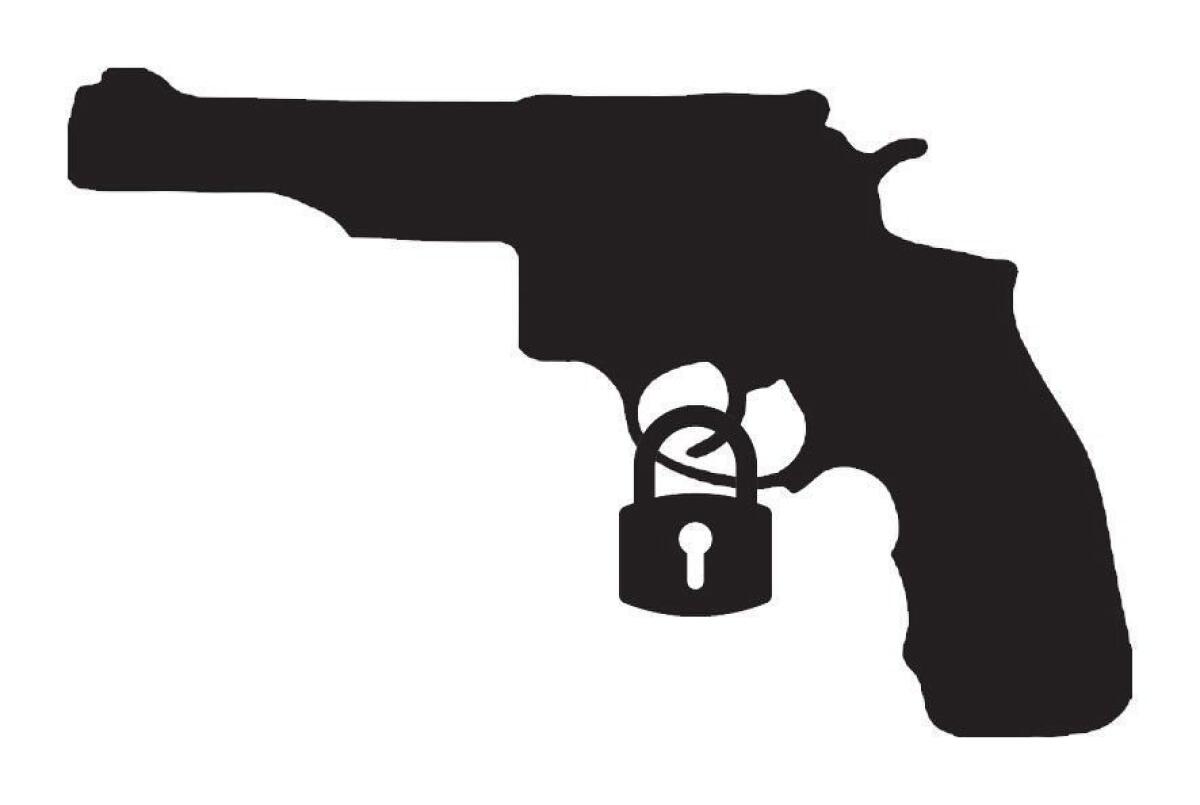Access to safer guns is favored by most in U.S., poll finds

The U.S. public is open to buying guns that are made or altered so that they cannot be fired by a child or a person not authorized to use them, a new survey finds.
- Share via
Nearly 6 in 10 Americans — including 42.8% of gun owners — say that if they were to buy a new firearm, they would choose one equipped with technology that prevents it from being fired by an unauthorized user, a new national survey has found.
The survey suggests an openness to so-called smart guns, personalized weapons and childproof firearms. Their development has been championed in recent years by the Obama administration as well as a range of physicians’ groups and public health advocates.
All have argued that the adoption of such guns would reduce the number of accidental injuries — often involving children — and suicides by teens and others who use someone else’s weapon to end their lives. The technology probably would prevent criminals from using stolen firearms and protect most gun owners from having their weapon wrestled away and used against them.
In the United States, 33,636 people die each year because of gun violence.
The introduction of such weapons in the marketplace, however, has met fierce resistance from gun rights organizations and some gun owners, and products incorporating owner authorization technology are not widely available. Critics argue that the new generation of guns will prove unreliable and that few Americans want them.
The new survey results challenge that view.
In a nationally representative Web-based poll of 3,949 Americans, researchers from Johns Hopkins, Harvard and Northeastern universities found that 58.8% of respondents said they would be willing or very willing to buy a gun described as childproof; 18.2% called themselves unwilling or very unwilling to purchase such a gun; and the remaining 23% said they were undecided, according to the report published Thursday in the American Journal of Public Health.
Among those who already own guns, 42.8% said they would be willing or very willing to purchase a childproof gun. An additional 24.2% were unwilling or very unwilling to do so, and 33% were undecided.
Openness to smart guns was higher among women, with 62% saying they would be willing to buy one. That compares with 55.5% of men surveyed.
Interest was also high among respondents who have children in the home — 65% said they would be willing to buy one — though 56.3% of those with no children in the home favored the availability of such guns as well.
Self-described liberals were most likely to pronounce themselves willing to buy a childproof gun (71.4%). Smaller majorities of those who identified themselves as politically moderate (55.8%) or conservative (55.7%) did so too.
Among gun owners, those owning only handguns were more likely to declare themselves willing to buy a childproof gun than were those who owned only long guns, a category that includes rifles (54.9% versus 48.4%). People who owned multiple types of guns were most resistant to the new technologies, with 30.3% declaring themselves unwilling to buy such a firearm and 35.5% saying they would consider it.
Stephen Teret, a gun violence researcher at Johns Hopkins University, said the survey might prompt gun manufacturers to rethink their resistance to adapting user authorization technologies to new or existing guns.
“There’s a market out there,” Teret said. “For domestic gun manufacturers, it suggests that if they want to survive, they’d better start moving in this direction. And for venture capitalists who want to make a lot of money, it suggests that they can do well financially by doing good.”
Indeed, although the federal government has fueled the development of smart weapon technology with millions of dollars over the years, venture capitalists have recently moved in to promote it.
The San Francisco-based Smart Tech Challenges Foundation, led by venture capitalist Ron Conway, has distributed $1 million in donated funds to entrepreneurs and inventors seeking to develop technologies that would make guns more resistant to unauthorized use.
Next month, the foundation and the gun control advocacy group Washington CeaseFire will host a symposium to present developments in safer gun technology.
King County Sheriff John Urquhart in Seattle, San Francisco Police Chief Greg Suhr and Richard Beary, president of the International Assn. of Chiefs of Police, have said police should consider adopting smart guns.
Meanwhile, the debate over childproof guns has gotten the attention of presidential hopefuls.
On Tuesday, New Jersey Gov. Chris Christie declined to sign into law a measure that would have required gun dealers to sell at least one model designed to prevent unauthorized use. That requirement would have become effective once the New Jersey attorney general found that a firearm meeting that description was reliable and safe.
The now-dead measure would have replaced a 14-year-old law that requires all New Jersey gun dealers to sell only weapons with safeguards against unauthorized use, once a reliable model is available. That mandate has been excoriated by gun rights advocates. Even backers of childproof guns have called for its repeal, describing it as a “poison pill” that hampers the development of safer weapons.
The National Rifle Assn. opposed the new bill as well. Calling the mandate “misguided,” the NRA said its effect would be similar to the government forcing auto dealers to offer new self-driving car technology regardless of consumer demand or viability.
Follow me on Twitter @LATMelissaHealy and “like” Los Angeles Times Science & Health on Facebook.
MORE SCIENCE COVERAGE:
Bizarre birth defect is on the rise, the CDC reports
California Coastal Commission members to consider firing executive director
As Porter Ranch gas leak lingers, candidates smell a political opportunity







